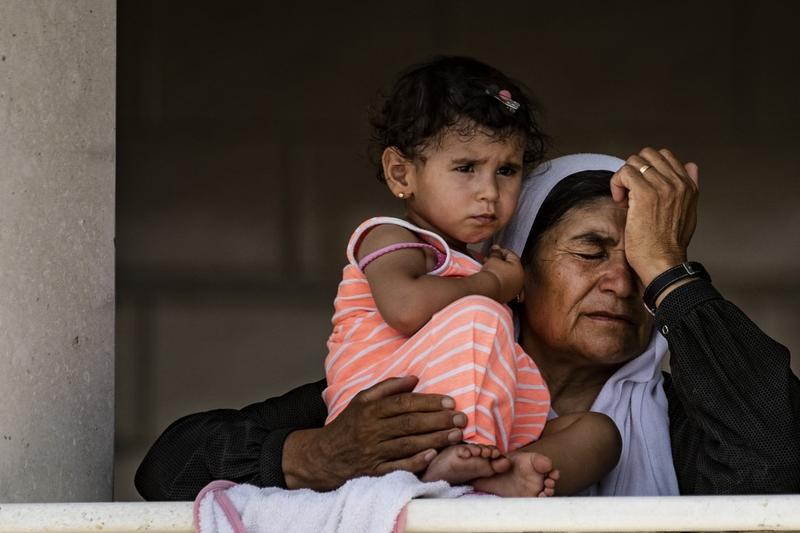 A Syrian woman, who was stranded following the closure of border due to the COVID-19 pandemic, waits with a child to cross into Iraqi Kurdistan from the Syrian side of the Semalka border crossing in northeastern Syria on July 29, 2020. (DELIL SOULEIMAN / AFP)
A Syrian woman, who was stranded following the closure of border due to the COVID-19 pandemic, waits with a child to cross into Iraqi Kurdistan from the Syrian side of the Semalka border crossing in northeastern Syria on July 29, 2020. (DELIL SOULEIMAN / AFP)
WASHINGTON - The United States on Wednesday imposed new sanctions aimed at cutting off funds for Syrian President Bashar al-Assad’s government and warned that anyone doing business with Damascus was also at risk of being blacklisted.
Assad’s son, Hafez, was among four people and 10 entities, including a Syrian army unit, targeted by Washington over accusations they either aided government funding through luxury real estate construction - sometimes on land belonging to displaced civilians - or prolonged the nearly decade-long war
Assad’s son, Hafez, was among four people and 10 entities, including a Syrian army unit, targeted by Washington over accusations they either aided government funding through luxury real estate construction - sometimes on land belonging to displaced civilians - or prolonged the nearly decade-long war.
ALSO READ: Tycoon: Front companies used to dodge sanctions for Assad
“More sanctions will follow as part of a sustained campaign of economic and political pressure to deny the Assad regime the resources it uses to wage war against the Syrian people,” the White House said in a statement.
A crackdown by Assad on protesters in 2011 led to civil war, with Iran and Russia backing the government and the United States supporting the opposition. Millions of people have fled Syria and millions more have been internally displaced.
The US sanctions, imposed under the Caesar Syria Civilian Protection Act and other measures, come as Assad grapples with a deepening economic crisis.
Syria was already subject to US and European Union sanctions that have frozen assets of the state and hundreds of companies and individuals. Washington also bans American export and investment in Syria, as well as transactions involving oil and hydrocarbon products.
ALSO READ: Passengers injured as Iran plane avoids US fighter jet over Syria
Wednesday’s action marks the second round of sanctions imposed by Washington under the Caesar Act, which can freeze the assets of anyone dealing with Syria, regardless of nationality, and cover many more sectors. It also targets those dealing with entities in Syria from Russia and Iran.
US Secretary of State Mike Pompeo said in a statement that the sanctions were intended to push Assad to take irreversible steps toward ending the country’s war as called for by the United Nations Security Council.
A senior US official, speaking on condition of anonymity, also cautioned investors in the Middle East, including Gulf nations, that the United States would not hesitate to blacklist those who help the Syrian government “steal land from displaced civilians to profit and support” Assad’s government.
ALSO READ: Long reach of US sanctions hits Syria reconstruction
Syrian authorities blame Western sanctions for widespread civilian hardship in the country, where a collapse of the currency has led to soaring prices and people struggling to afford food and basic supplies.
US Ambassador to the United Nations Kelly Craft told a Security Council meeting on Syria on Wednesday that Washington’s sanctions on Syria are not intended to harm the country’s people and do not target humanitarian assistance.
READ MORE: Turnout in Syria's parliamentary elections drops to 33.17%


